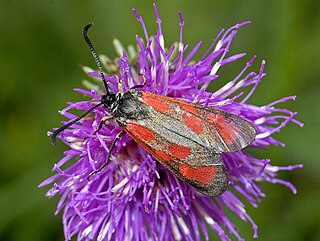Related Research Articles

Nod factors, are signaling molecules produced by soil bacteria known as rhizobia in response to flavonoid exudation from plants under nitrogen limited conditions. Nod factors initiate the establishment of a symbiotic relationship between legumes and rhizobia by inducing nodulation. Nod factors produce the differentiation of plant tissue in root hairs into nodules where the bacteria reside and are able to fix nitrogen from the atmosphere for the plant in exchange for photosynthates and the appropriate environment for nitrogen fixation. One of the most important features provided by the plant in this symbiosis is the production of leghemoglobin, which maintains the oxygen concentration low and prevents the inhibition of nitrogenase activity.

Lotus, a latinization of Greek lōtos (λωτός), is a genus of flowering plants that includes most bird's-foot trefoils and deervetches and contains many dozens of species distributed worldwide. Depending on the taxonomic authority, roughly between 70 and 150 are accepted. Lotus is a genus of legumes and its members are adapted to a wide range of habitats, from coastal environments to high altitudes.

Lotus corniculatus is a flowering plant in the pea family Fabaceae, native to grasslands in temperate Eurasia and North Africa. Common names include common bird's-foot trefoil, eggs and bacon, birdsfoot deervetch, and just bird's-foot trefoil, though the latter name is often also applied to other members of the genus.

Zygaena loti, the slender Scotch burnet, is a moth of the family Zygaenidae. It is a diurnal moth characterized by a black body, light colored legs, and red spots on its wings. The caterpillars are a yellow-green color and usually molt out of dormancy in late February to early March. The larvae feed on plants from the family Fabaceae until they enter their pupal stage and mature into adults in May to early June. For mating, Zygaenidae exhibit a dual-partner finding strategy, where females use pheromones while assuming a calling position, and males exhibit a patrolling behavior where they utilize both vision and the olfactory receptors in their antennae to locate a potential mate.

Plebejus idas, the Idas blue or northern blue, is a butterfly of the family Lycaenidae.

Mesorhizobium is a genus of Gram-negative soil bacteria. At least one, the nitrogen fixing species, Mesorhizobium loti, forms symbiotic root nodules with plants in the genus Lotus. Strain MAFF303099 of M. japonicum has been fully sequenced.
Mesorhizobium loti, formerly known as Rhizobium loti, is a Gram negative species of bacteria found in the root nodules of many plant species. Its name is a reference to Lotus corniculatus, a flowering plant from which it was originally isolated.
Mesorhizobium ciceri is a gram-negative, nitrogen-fixing motile bacteria from the genus of Mesorhizobium which was isolated from Chickpea nodules of Cicer arietinum in Spain. Rhizobium cicero was transferred to Mesorhizobium ciceri.
Mesorhizobium mediterraneum is a bacterium from the genus Mesorhizobium, which was isolated from root nodule of the Chickpea in Spain. The species Rhizobium mediterraneum was subsequently transferred to Mesorhizobium mediterraneum. This species, along with many other closely related taxa, have been found to promote production of chickpea and other crops worldwide by forming symbiotic relationships.
Phyllobacterium trifolii is a root-nodulating bacteria that was first isolated from nodules in Trifolium and Lupinus species. Its type strain is PETP02T.
Phyllobacterium bourgognense is a Gram-negative, oxidase positive, motile bacteria from the genus of Phyllobacterium which was isolated from rhizoplane of the plant Brassica napus.
Phyllobacterium brassicacearum is a Gram-negative, motile bacteria from the genus of Phyllobacterium which was isolated from rhizoplane of the plant Brassica napus.
Phyllobacterium endophyticum is a bacterium from the genus of Phyllobacterium which was isolated from a nodule of the plant Phaseolus vulgaris in Northern Spain.
Phyllobacterium ifriqiyense is a Gram-negative bacteria from the genus of Phyllobacterium which was isolated from root nodules from the plants Astragalus algerianus and Lathyrus numidicus.
Phyllobacterium leguminum is a Gram-negative bacteria from the genus of Phyllobacterium which was isolated from root nodules from the plants Argyrolobium uniflorum and Astragalus algerianus.
Phyllobacterium myrsinacearum is a Gram-negative bacteria from the genus of Phyllobacterium which was isolated from sugar-beet roots. Phyllobacterium rubiacearum differs from Phyllobacterium myrsinacearum in only two nucleotides. Further analysis indicate that Phyllobacterium myrsinacearum and Phyllobacterium rubiacearum should be classified as only species.
Phyllobacterium sophorae is a Gram-negative bacteria in the genus Phyllobacterium which has been isolated from the root nodules of the plant Sophora flavescens.
Oricola is a genus of bacteria from the family of Phyllobacteriaceae.
Oricola cellulosilytica is a Gram-negative, strictly aerobic, non-spore-forming, cellulose-degrading and motile bacterium from the genus of Oricola which has been isolated from water from the Hualien River on Taiwan.
References
- ↑ LSPN lpsn.dsmz.de
- ↑ Straininfo of Phyllobacterium loti
- ↑ Sanchez, M.; Ramirez-Bahena, M. -H.; Peix, A.; Lorite, M. J.; Sanjuan, J.; Velazquez, E.; Monza, J. (2013). "Phyllobacterium loti sp. nov. Isolated from nodules of Lotus corniculatus". International Journal of Systematic and Evolutionary Microbiology. 64 (Pt 3): 781–6. doi:10.1099/ijs.0.052993-0. PMC 4080735 . PMID 24271211.